Message du maire et du président du comité d’orientation permanent des finances et du développement économique
Nous avons l’honneur de présenter la mise à jour préliminaire du budget de 2025 au conseil municipal et aux citoyens de Winnipeg. Le budget de cette année est plus que de simples chiffres sur une page – il reflète vos priorités et constitue une feuille de route pour rendre Winnipeg plus fort, sécuritaire et durable.
La présente mise à jour représente le travail acharné de nombreuses personnes, y compris notre groupe de travail sur le budget – constitué des conseillers Jeff Browaty, Matt Allard et Evan Duncan – ainsi que la chef des finances Tracy Graham et son personnel dévoué. Ces personnes ont consacré d’innombrables heures à l’élaboration du budget, et leurs efforts méritent nos sincères remerciements.
De récents sondages d’opinion publique réalisés par Probe Research et Abacus Data ont démontré que les Winnipégois veulent davantage d’investissements dans les services offerts à notre ville en pleine croissance, et qu’ils accordent la priorité au renforcement de la sécurité dans les quartiers et à l’amélioration des infrastructures. Le présent budget respecte ces priorités, tout en adressant des défis financiers de longue date.
Winnipeg est en pleine croissance, mais nos ressources en matière de sécurité publique n’ont pas progressé au même rythme. La crise persistante des opioïdes, l’augmentation des appels aux services d’incendie, la violence des rues et les vols agressifs en magasin ne sont que quelques-uns des défis auxquels les premiers intervenants font face tous les jours. Entre-temps, au Service de police de Winnipeg, le rapport entre le nombre d’agents et de résidents a chuté de 17,5 % depuis 2014, et aucun pompier supplémentaire n’a été ajouté au cours des dernières années.
Le présent budget commence à adresser ces défis. Il finance :
- 36 nouveaux agents de police et des voitures de patrouille supplémentaires au cours des deux prochaines années;
- 15 agents de sécurité communautaire supplémentaires pour améliorer la sécurité du transport en commun;
- 24 nouveaux pompiers au Service d’incendie et de soins paramédicaux de Winnipeg;
- 1 million de dollars envers la prévention communautaire du crime grâce à des programmes de loisirs pour les jeunes dans les quartiers où les besoins sont élevés.
Ces investissements visent à rassurer les membres du public que les services d’urgence seront là pour eux en cas de besoin, et à donner à nos premiers intervenants le soutien dont ils ont besoin pour assurer la sécurité de notre ville.
Nous allons faire des investissements historiques dans les routes de Winnipeg pour améliorer la mobilité, la sécurité et la qualité de vie de tout le monde. Le budget de 2025 prévoit un investissement sans précédent de 1 milliard de dollars dans la réfection des rues régionales et locales au cours des six prochaines années. Pour 2025 seulement, 169,3 millions de dollars sont prévus pour des projets de réparation des routes, de transport actif et de sécurité routière, par rapport à 146,52 millions de dollars en 2024.
Le soutien du transport en commun va aussi augmenter; en effet, la subvention de fonctionnement atteindra le montant historique de 124 millions de dollars alors que nous nous préparons à lancer notre nouveau réseau de transport en commun à l’échelle de la ville l’été prochain. Nous allons aussi maintenir les investissements prévus dans les projets communautaires et récréatifs tout en réorientant les ressources vers la reconstruction des installations aquatiques de Saint-Boniface, qui s’étaient détériorées de façon irréparable.
En vertu des lois provinciales, Winnipeg ne peut pas prévoir de déficits de fonctionnement. Toute insuffisance de fin d’année doit être comblée immédiatement au cours de l’année qui suit grâce à des réserves, des réductions de service ou des hausses d’impôts. Toutefois, des hausses des coûts associés aux contrats, des accords salariaux attribuables à l’inflation et diverses contraintes en matière de subventions et de recettes se sont conjugués pour augmenter les risques de déficits structurels en fin d’année pendant les années 2020.
Le groupe de travail sur le budget a identifié des questions liées au risque s’élevant à 84,2 millions de dollars pour l’année financière 2025 à elle seule. Celles-ci incluent un nombre croissant de réclamations auprès de la Commission des accidents du travail, une hausse des coûts liés aux contrats de déneigement et des insuffisances associées aux recettes provenant des tarifs d’autobus. Entre-temps, en partie en raison de l’inflation et des coûts passés liés à la pandémie, la réserve d’équilibrage (RE) de la Ville sera complètement épuisée en fin 2024. Pour assurer la santé financière à long terme de la Ville, nous avons la responsabilité de commencer à rétablir la RE afin de pouvoir bien gérer les risques.
Le présent budget adopte une approche équilibrée :
- Une hausse de 5,95 % des impôts fonciers – inférieure à la moyenne canadienne en 2024 (6 %) et à de nombreuses hausses post-pandémiques dans d’autres villes – dont 2 % sera consacré aux routes, 1,5 % aux services essentiels et 2,45 % à la sécurité publique et à la gestion des risques financiers
- La création d’un nouveau processus d’amélioration continue mené par notre chef des finances et visant à identifier des économies continues
- L’étude de différents gains d’efficacité, comme la mise à l’essai de pratiques de déneigement plus judicieuses, visant à nous permettre d’économiser des millions de dollars
Le groupe de travail sur le budget poursuivra également son travail jusqu’au printemps 2025 à titre d’équipe de gestion du budget pour étudier les possibilités d’économies dont on ne tiendrait normalement pas compte lors du cycle budgétaire.
Nous voulons bâtir la ville que la population winnipégoise mérite, et nous savons que nous ne pouvons pas y parvenir seuls. C’est pourquoi nous travaillons en étroite collaboration avec nos partenaires provinciaux et fédéraux pour obtenir le soutien dont notre ville en pleine croissance a tant besoin.
Notre modèle financier est désuet par rapport à celui de nombreuses autres villes, et il ne suit pas le rythme de croissance de l’économie, de la population ou de l’inflation. Contrairement à Régina et à Saskatoon, Winnipeg n’a pas d’accord de partage des recettes liées à la croissance. Des villes comme Halifax, Québec, Toronto et la région métropolitaine de Vancouver bénéficient d’un soutien provincial leur permettant d’envisager des modes d’imposition plus équitables que les impôts fonciers – ce que Winnipeg n’est pas présentement en mesure de faire.
Nous avons réalisé certains progrès. En novembre, le premier ministre Wab Kinew a annoncé une hausse des subventions municipales pour les cinq prochaines années qui ajoutera plus de 7 millions de dollars annuellement à la subvention de fonctionnement accordée à Winnipeg. Ces fonds nous aideront à rétablir notre RE afin que nous puissions bien gérer les risques futurs. Bien qu’il s’agisse d’une mesure positive, ce n’est qu’une solution partielle. Pour assurer la stabilité financière à long terme, il faut apporter des changements systémiques à la façon dont Winnipeg est financé.
Au niveau fédéral, le Fonds pour accélérer la construction de logements du Canada continue d’apporter un soutien essentiel aux projets de logement. L’élaboration du budget de 2025 visait à établir une distinction claire entre cet investissement fédéral précieux et les autres coûts de fonctionnement.
L’augmentation de la capacité de traitement des eaux usées est essentielle à la réalisation de ces projets de logement, mais la Ville ne peut pas payer à elle seule le projet du centre de dépollution de l’eau du North End (CDENE) sans augmenter considérablement les coûts pour les contribuables. Nous sommes reconnaissants envers les gouvernements fédéral et provincial pour leurs discussions constructives sur le financement du CDENE. Il est essentiel de trouver une solution – non seulement pour l’aménagement de logements, mais aussi pour la santé de notre environnement et des générations futures.
Des partenariats comme ceux-ci sont essentiels pour permettre à Winnipeg de réaliser son potentiel. Nous continuerons à lutter pour obtenir les outils et le financement nécessaires pour créer une ville plus sécuritaire et dynamique pour tout le monde.
Pour conclure, le présent budget reflète les priorités des Winnipégois – des quartiers plus sécuritaires, de meilleures routes et une planification financière responsable. Ensemble, nous bâtissons une ville plus sécuritaire, plus forte et prête pour l’avenir.
Scott Gillingham
Maire
Ville de Winnipeg
Jeff Browaty
Conseiller de Kildonan-Nord
Président du comité d’orientation permanent des finances et du développement économique
Calendrier des séances sur la mise à jour préliminaire du budget pluriannuel
Soumettez des commentaires sur le budget préliminaire
Participer à une réunion
Inscrivez-vous pour vous présenter en personne à titre de délégation lors d’une réunion ou soumettez des commentaires écrits pour les dossiers publics
Participation au budget
Merci à toutes les personnes ayant fourni leurs rétroactions sur le budget de 2025. Le rapport sur la participation publique (PDF, 113KB) et les annexes (anglais seulement) (PDF, 554KB) sont disponibles. Le rapport présente les commentaires que nous avons obtenus des residents.
La mise à jour préliminaire de 2025 du budget équilibré pluriannuel de 2024-2027 de la Ville de Winnipeg a été présentée lors d’une réunion extraordinaire du comité exécutif le mercredi 11 décembre 2024.
Après une période de 33 jours pendant laquelle tous les membres du conseil municipal et du public ont pu étudier la mise à jour préliminaire du budget, des réunions publiques permettant d’entendre les délégations et d’envisager les changements ont lieu aux dates suivantes :
- Le lundi 13 janvier 2025
Comité d’orientation permanent des biens et de l’aménagement - Le mardi 14 janvier 2025
Comité d’orientation permanent des eaux, des déchets et de l’environnement - Le mercredi 15 janvier 2025
Comité d’orientation permanent des services communautaires - Le jeudi 16 janvier 2025
Comité d’orientation permanent des travaux publics - Le vendredi 17 janvier 2025
Comité d’orientation permanent des finances et du développement économique - Le lundi 20 janvier 2025
Conseil de police de Winnipeg - Le mardi 21 janvier 2025
Comité exécutif – Présentations sur le budget - Le mercredi 22 janvier 2025
Comité exécutif – Délégations liées au budget - Le vendredi 24 janvier 2025
Comité exécutif – Recommandations finales sur le budget - Le mercredi 29 janvier 2025
Examen du budget par le conseil municipal
À NOTER : On encourage les résidents à consulter le calendrier des séances du conseil municipal et de ses comités au cas où l’heure des séances changerait.
Annonces relatives au budget
- La mise à jour préliminaire du budget de la Ville sera publiée le 11 décembre
Le 25 novembre 2024 - Le maire demande l’agrandissement de l’équipe de sécurité du transport en commun
Le 26 novembre 2024 - Les niveaux de dotation en personnel de la Ville ne suivent pas le rythme de croissance de la population; le maire demande un investissement dans les services
Le 5 décembre 2024 Winnipeg est le chef de file canadien en matière d’abordabilité des impôts fonciers
Le 10 décembre 2024
Coup d’œil sur le budget préliminaire
* Sous réserve de l’approbation du conseil municipal
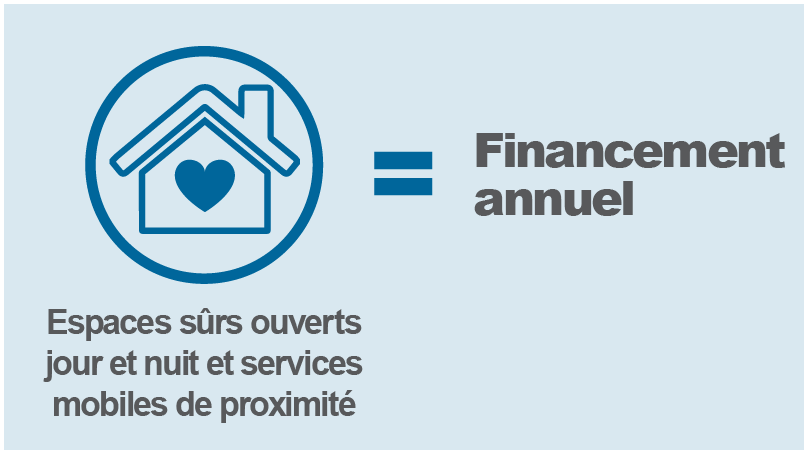
Le centre-ville
- Financement annuel pour les espaces sûrs ouverts jour et nuit et les services mobiles de proximité
- Investissement infrastructurel de 250 000 $ lié à CentrePlan 2050 en 2025
- Subvention d’investissement pour Portage Place – 16,1 millions de dollars
- Investissement de 4,3 millions de dollars dans les parcs du centre-ville
- Financement de fonctionnement pour le Downtown Community Safety Partnership, la ZAC du centre-ville et la ZAC du quartier de la Bourse
- Financement pour les programmes pour jeunes du Y du centre-ville
- Fonds d’immobilisation pour les arts au centre-ville de 500 000 $ annuellement pour aider des établissements artistiques importants
- Financement de fonctionnement pour CentreVenture
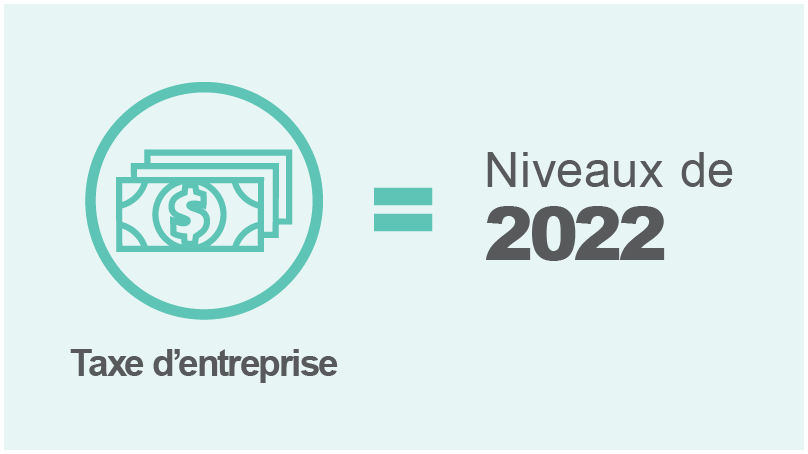
Une économie robuste
- Gel du taux de la taxe d’entreprise aux niveaux de 2022
- Hausse de 10 ETP en 2025, et de jusqu’à 38 ETP de plus au total d’ici 2027, pour améliorer le rendement des services de permis
- Hausse du financement et utilisation d’une nouvelle formule pour le Fonds de marketing pour les événements spéciaux
- Investissement de 1,2 million de dollars en subventions et en services en nature pour les activités de 2025 associées à la Coupe Grey
- 2,2 millions de dollars pour la phase 2 du système numérique de délivrance des permis à l’aide des fonds du Fonds pour accélérer la construction de logements (FACL) du gouvernement fédéral
- Financement de la station de traitement des eaux usées du North End (CDENE) visant à favoriser la croissance et le développement de la ville
- Soutien continu en dotation de personnel au site Naawi-Oodena
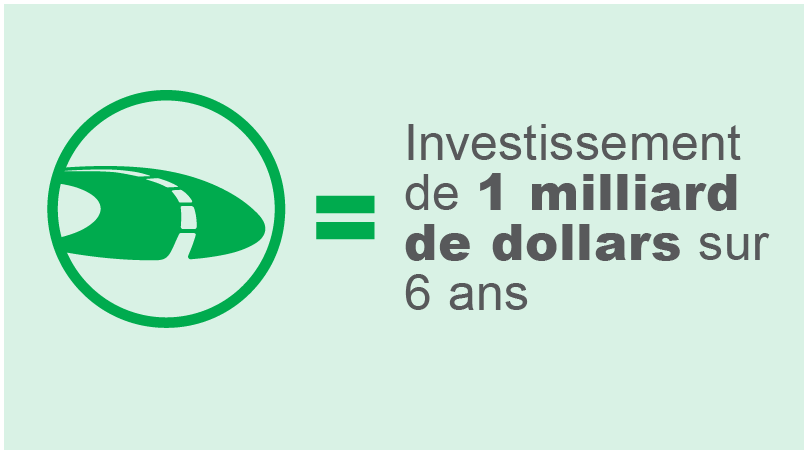
Une ville écologique et en pleine croissance dont les infrastructures sont renouvelées de façon durable
- Investissement sans précédent de 1 milliard de dollars sur 6 ans dans la réfection des routes
- Amélioration de la sécurité routière – Investissement de 36,6 millions de dollars sur 6 ans
- Investissement de 37,1 millions de dollars sur six ans dans le Programme visant les infrastructures piétonnières et cyclables
- Projet de 19,4 millions de dollars au total visant le passage supérieur du chemin Pembina (plus 8,1 millions de dollars inclus dans la réfection des routes régionales)
- Lancement d’un nouveau réseau de lignes d’autobus d’ici la fin juin 2025
- Subvention accrue au transport en commun, passant de 114,5 millions de dollars en 2024 à 124 millions de dollars en 2025, y compris deux nouvelles lignes en 2025
- Agrandissement du parc d’autobus à zéro émission en 2025 et en 2026, et amélioration de la capacité en passagers à l’aide de nouveaux autobus conventionnels à partir de 2027
- Programme de chariots verts (matières organiques) – Approuvé par le conseil municipal le 18 juillet 2024
- Régénération de la forêt urbaine – ~60 millions de dollars
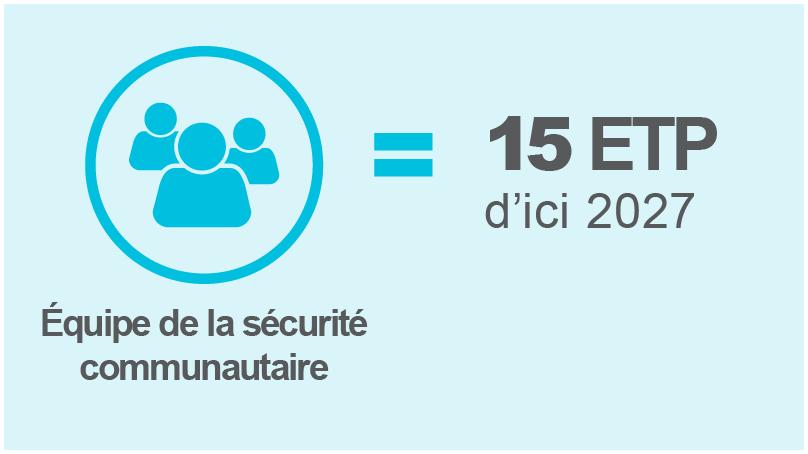
Une ville vivable, sécuritaire, saine et heureuse
- Agrandissement de l’équipe de la sécurité communautaire par 63 % de 2024 à 2027 (15 nouveaux membres du personnel)
- Ajout de 36 nouveaux agents de police pour améliorer la sécurité publique
- Ajout de 24 nouveaux pompiers pour répondre à la demande accrue en matière de services
- 1 million de dollars envers les programmes pour les jeunes dans les quartiers où les besoins sont élevés
- Ouverture de la bibliothèque Northwest à l’automne 2025
- Investissement de 3,1 millions de dollars dans les installations aquatiques extérieures de Saint-Boniface
- 10 nouvelles aires de jets d’eau sur 5 ans
- Investissement de 36 millions de dollars sur 6 ans dans les parcs régionaux et locaux
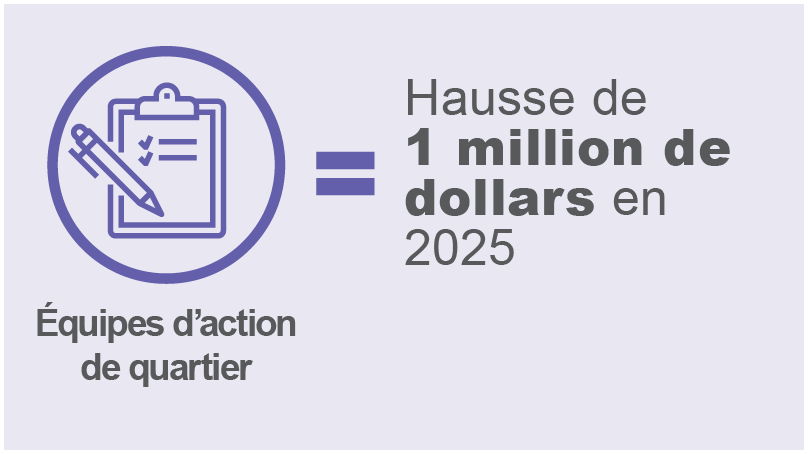
Une ville au service des résidents grâce à un service à la clientèle amélioré
- Équipes d’action de quartier – 12 ETP supplémentaires en 2025 pour totaliser 28 ETP (45 ETP d’ici 2027)
- Reprise du Programme de nettoyage des conduites d’eau principales
- Caserne de Waverley-Ouest 12,5 millions de dollars
- Financement supplémentaire comprenant deux ETP en réaction au Rapport d’audit sur la main-d’œuvre
- Investissement dans les véhicules de la police et les camions pompe-échelle des services d’incendie
- Améliorations continues d’environ 51 millions de dollars pour gérer les dépenses, améliorer le service à la clientèle et trouver des gains d’efficacité
Recettes clés
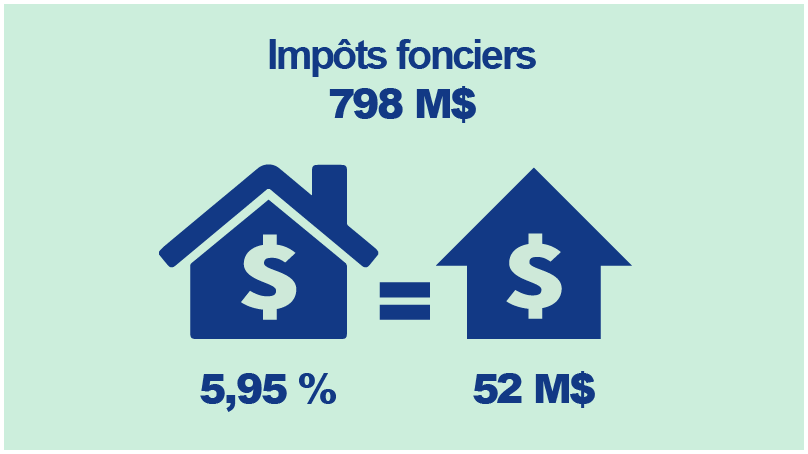
Impôts fonciers
Hausse des impôts fonciers : 5,95 %
2 % affecté aux routes, 1,5 % envers les activités essentielles et 2,45 % envers les investissements dans la sécurité publique et les risques financiers immédiats, ce qui ajoute 52 millions de dollars en 2025
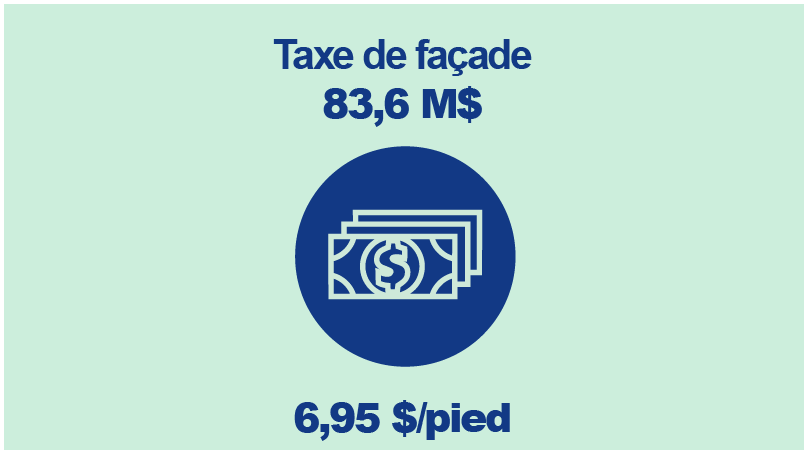
Taxe de façade
Maintien de la taxe de façade à 6,95 $ par pied, ce qui génère 83,6 millions de dollars
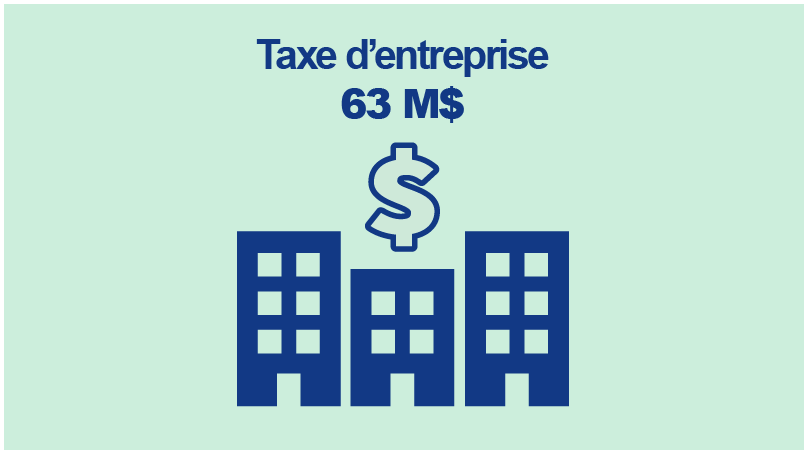
Taxe d’entreprise
Maintien à 4,84 % de la taxe d’entreprise et à 47 500 $ du seuil du crédit d’impôt pour petites entreprises
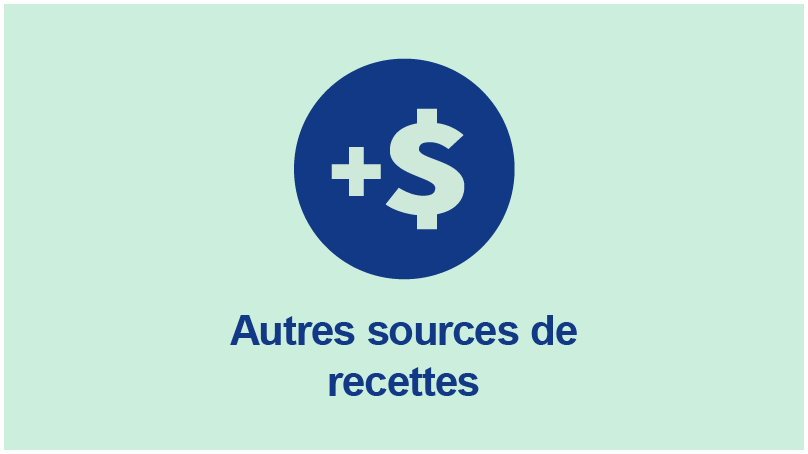
Autres sources de recettes
- Tarif d’autobus comptant pour adultes – 3,35 $ (Hausse de 10 cents par rapport à 2024). Réduction de 50 % applicable au WINNpass.
- Hausses annuelles de 5 %, 2,5 % et 2,5 % pour les autres frais et tarifs.
- Recettes totales de la Ville – 2,3 milliards de dollars (hausse de 103 millions de dollars par rapport à 2024).
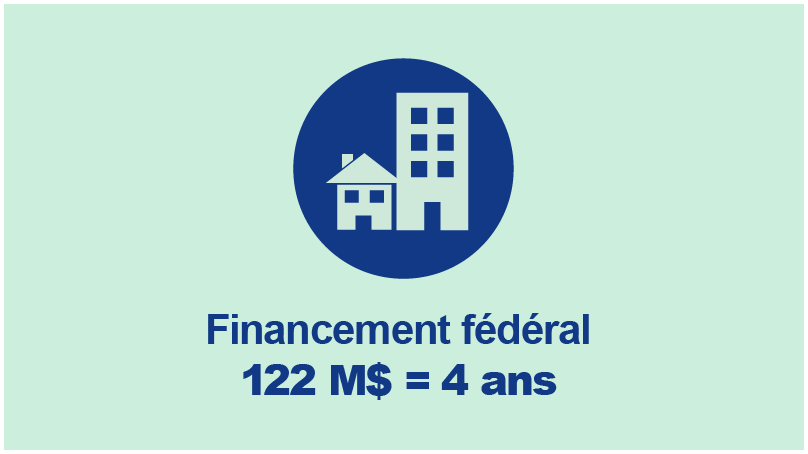
Financement fédéral
Fonds pour accélérer la construction de logements – 122 millions de dollars sur quatre ans
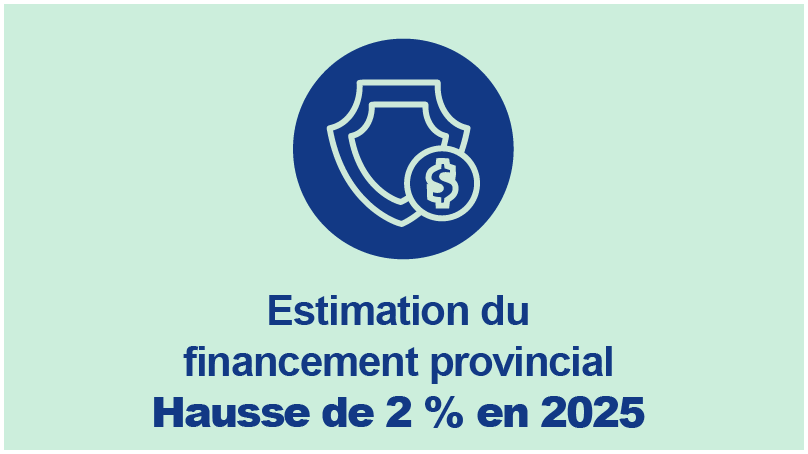
Estimation du financement provincial
- Financement général – 143,4 millions de dollars
- Financement de la police – 24,7 millions de dollars
- Autre financement – 79 millions de dollars
